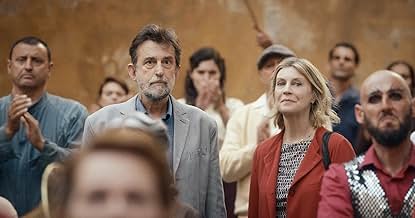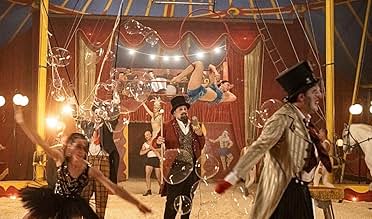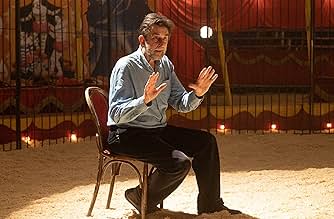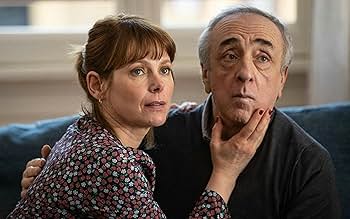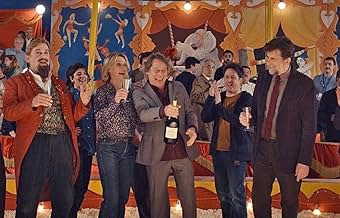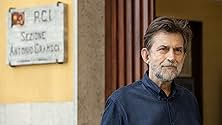CALIFICACIÓN DE IMDb
6.7/10
3.8 k
TU CALIFICACIÓN
Un director de cine tiene problemas con su familia y con su película más reciente que trata sobre el impacto que tuvo para el partido comunista Italiano la invasión soviética a Hungría en 19... Leer todoUn director de cine tiene problemas con su familia y con su película más reciente que trata sobre el impacto que tuvo para el partido comunista Italiano la invasión soviética a Hungría en 1956.Un director de cine tiene problemas con su familia y con su película más reciente que trata sobre el impacto que tuvo para el partido comunista Italiano la invasión soviética a Hungría en 1956.
- Dirección
- Guionistas
- Elenco
- Premios
- 2 premios ganados y 21 nominaciones en total
Opiniones destacadas
#Cannes2023# A film by a white old male director that far exceeded my expectations. It can be considered as a self-reflection and self-deprecating work from the usually narcissistic Moretti. He directed and acted in a movie that explores his journey from denial to ultimately admitting his creative decline, the irrelevance of his themes (at least to a diminishing audience), his inability to work without his wife "assistant" and the growing resentment from his crew towards his mansplaining . In the end, he also concludes with a false sense of hope, summarizing it as a lament for the leftist movements of the 1950s and acknowledging his inability to find a good ending. This self-analysis and sincere display of vulnerability moved me. There are countless directors in their old ages who have run out of creative juices, but not many can be this candid. Additionally, there are Fellini-esque elements throughout the film, with circus motifs and ensemble dancing, adding a touch of delightful nostalgia. @ Cannes Cineum Aurore.
On the occasion of his 70th birthday, Director Moretti sends a heartfelt love letter to his fans, reliving the themes that made him popular and acclaimed over the course of 50 years. The story jumps between three distinct layers: Moretti's own life, the movie he is shooting, and the movie he is about to make, with each providing its own share of humorous moments, successes, and of course, failures (due to Moretti's intrinsically pessimistic outlook). Compiled from both his own works and the works of those who have inspired him, particularly Federico Fellini, the movie is ultimately an observation of the passage of time, with a faint but lasting hope of a future. When you let it be.
I found this film very enjoyable and funny. Of course it's not the first film about a director making a film, and I had only seen two of his films before so I can't tell to what extent this is "always the same Moretti stuff", but to me this film seemed rather unique and original. Nanni Moretti himself (called Giovanni in the film) is the main protagonist here, and he is mightily annoying, talking endlessly without listening properly to others including his wife, with a voice that reveals a clear sense for his own importance. This is however obviously ironic and self-deprecating (the Guardian reviewer, who slaughtered this film, apparently missed that, which is hard to believe but maybe something got lost in translation?) in an often very funny way. It helps to know such people in real life for appreciating his portrayal. Otherwise he is directing a film about Italian communists' reaction to the 1956 Hungarian uprising while the Italian communists host a Hungarian circus in Rome. He also deranges another film in which his wife participates lecturing the director on the "correct" use and non-use of violence in films. Meanwhile his very convincing down-to-earth wife prepares to separate from him (the audience can clearly see why she would want that) with a counsellor as on her own she apparently doesn't manage to take this step on her own. There is some surreal stuff with nods to Fellini and Godard in the film, and apart from Moretti's misbehaviour and the breaking down of his marriage there's some politics, feminism, and thought about cinema back then and now in the film. Moretti's general state resonates well with what goes on it the film he makes and how he directs it. Sometimes there is more than one layer of irony and it is not necessarily easy to get it all, but I for sure got enough out of it. There is a fine line between annoyance and fun in Moretti's ironic self-portrayal, but this came out on the right side for me, just about. Ultimately there is some development in his personality in a somewhat more pleasant direction; he can confess his own uncertainty and vulnerability, but will it last? I wasn't very keen on the end, but also this was ironically broken, which was well needed to make it acceptable for me. The film has its flaws, but I was well entertained, and I raise my hat to Moretti for his self-irony.
Someone asked me one day which person in history I would want to have lunch with. While Julius Caesar, Jesus Christ, Napoleon or George Washington may have been good candidates, I couldn't think of a name that appealed more to me than Nanni Moretti. Over the last 25 years, starting with the exceptional Palombella Rossa, Nanni Moretti has had an uninterrupted streak of masterpieces including Caro Diario, The Son's Room, The Caiman, We Have a Pope, Mia Madre and Three Floors, to name a few, which rank among the best films made in that time period, and make Nanni Moretti one of the greatest living filmmakers.
With that track record, I imagine Moretti could only disappoint. And disappoint he does with A Brighter Tomorrow. Don't get me wrong, we are still talking about one of the best filmmakers in the world, one that certainly knows how to make a good movie. But this one feels miles behind his other films. One of the things that hit you is how self-referential it is. From the name of the circus in the film (Budavari, a reference to Palombella Rossa) to the obsession with shoes (a reference to his earlier films, in particular Bianca) to a scene playing with a soccer ball (a reference to Caro Diario), it feels reheated, almost vain, from a filmmaker who always looked decidedly into the future. And this feeling of lack of ideas is made worse by abundant references to classic films, in particular those of Fellini.
In a way, these shortcomings arise from the subject of the film itself: it is ultimately about the gap between Moretti's values, represented by his films and his film culture, and today's world. But the issue is the message feels conveyed without passion, which has been the one constant in his filmography to this day. A Brighter Tomorrow therefore disappoints. We can only hope for Moretti's next film and remember all of his previous ones.
With that track record, I imagine Moretti could only disappoint. And disappoint he does with A Brighter Tomorrow. Don't get me wrong, we are still talking about one of the best filmmakers in the world, one that certainly knows how to make a good movie. But this one feels miles behind his other films. One of the things that hit you is how self-referential it is. From the name of the circus in the film (Budavari, a reference to Palombella Rossa) to the obsession with shoes (a reference to his earlier films, in particular Bianca) to a scene playing with a soccer ball (a reference to Caro Diario), it feels reheated, almost vain, from a filmmaker who always looked decidedly into the future. And this feeling of lack of ideas is made worse by abundant references to classic films, in particular those of Fellini.
In a way, these shortcomings arise from the subject of the film itself: it is ultimately about the gap between Moretti's values, represented by his films and his film culture, and today's world. But the issue is the message feels conveyed without passion, which has been the one constant in his filmography to this day. A Brighter Tomorrow therefore disappoints. We can only hope for Moretti's next film and remember all of his previous ones.
I liked the film as a whole, Moretti is certainly someone who loves cinema and in general all the art of old Italy, you can see everything in the protagonist played and representing himself, but I can't fully understand the intent because I don't know well the real communist ideologies or the Soviet ones or the Italian Communist Party. But I can appreciate the desire to create well-made characters, in a world where cinema is produced only by big houses that do not grasp the essence of art in any way the protagonist lives his life completely in art, in his own art and in the art of others, and when he gets the chance he analyzes art in all the ways it's possible to do it and all he does is bring his art back to the screen, no matter the money, just instinctively as an artist, it's the first film I've seen by this director and consequently I don't know if it's below or above average compared to the others, but I give it a 7 because it's a film that has soul and the desire to tell something.
¿Sabías que…?
- TriviaSelected to compete for the Palme d'or in the 2023 Cannes Film Festival. This is the ninth time that a film from director Nanni Moretti is selected at Cannes; every movie he made since "Caro diario" has been at Cannes, he even won the Palme d'or in 2001 with "The Son's Room."
- ConexionesFeatures La dulce vida (1960)
Selecciones populares
Inicia sesión para calificar y agrega a la lista de videos para obtener recomendaciones personalizadas
- How long is A Brighter Tomorrow?Con tecnología de Alexa
Detalles
- Fecha de lanzamiento
- Países de origen
- Idiomas
- También se conoce como
- A Brighter Tomorrow
- Locaciones de filmación
- Productoras
- Ver más créditos de la compañía en IMDbPro
Taquilla
- Presupuesto
- EUR 12,284,110 (estimado)
- Total a nivel mundial
- USD 6,668,544
- Tiempo de ejecución
- 1h 35min(95 min)
- Color
- Relación de aspecto
- 1.85 : 1
Contribuir a esta página
Sugiere una edición o agrega el contenido que falta

![Ver Trailer [OV]](https://m.media-amazon.com/images/M/MV5BZjUxOGY3NjUtN2RiNy00NDlkLWE4MGYtZjkxMTU2MmNmOTBmXkEyXkFqcGdeQXRyYW5zY29kZS13b3JrZmxvdw@@._V1_QL75_UX500_CR0)

